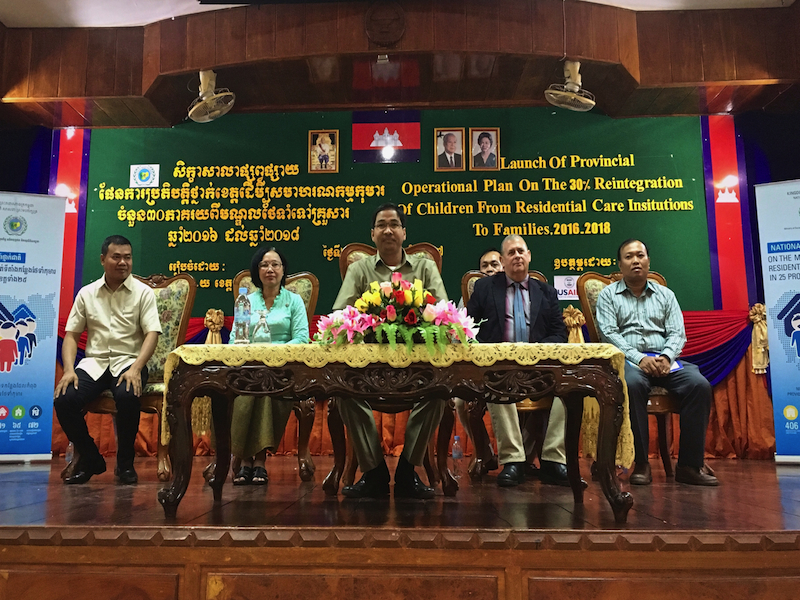BATTAMBANG CITY – Though they live in orphanages, an estimated 13,000 children in facilities across Cambodia have at least one living parent. As part of a sea change in government policy in a country with a checkered history with orphanages, officials in Battambang province on Tuesday kicked off a pilot program that aims to return children to their families.
The pilot will require the province’s 35 orphanages to work alongside provincial and local-level officials and social workers to reduce their populations by 30 percent—440 children in total—by the end of next year, officials said.

“Every child has the right to grow up with a family and, if that’s not possible, in a community,” said Bruce Grant, chief of Unicef Cambodia’s child welfare program, during a kick-off event at Battambang Provincial Hall. “Residential care should be the option of last resort for the shortest period of time.”
The pilot is part of a governmental push to regulate Cambodia’s sprawling and disorganized orphanage system that began in 2015 with a drive to register and map orphanages across the country. It is the first step aimed at moving the system away from institutionalized care toward communityand family-based care, though some question the risks that children could face in returning to households they once left, often for good reason, and the support that will be available.
The policy calls on orphanage staff to assess the families of every child living at their centers to determine whether they could be safely united with a living parent or extended family member, Mr. Grant said. It also asks “that you don’t open new beds or you don’t extend your services,” he told a room full of orphanage staff.
The government has determined that cleaning up the country’s orphanages can only be achieved with local officials’ engagement, said Ros Sokha, chief of the Social Affairs Ministry’s child welfare department.
An estimated 80 percent of the country’s 16,579 children living in orphanages have at least one living parent, according to Unicef data from 2015. Phnom Penh and the provinces of Siem Reap, Battambang, Preah Sihanouk and Kandal host 71 percent of all the country’s orphanage population, making them focal points for the initiative.
While Phnom Penh and the three other provinces are expected to follow suit, Battambang is the first to pilot the policy, which holds provincial, district and commune officials responsible for signing off on reintegration, Mr. Sokha said.
Children are largely sent to orphanages because of poverty and lack of access to education and health services, experts across the field say.
In taking back their children, households are intended to receive extra support from a range of NGO partners, said Phuong Sith, chief of the Battambang social affairs department’s child welfare bureau.
In two state-run orphanages, 98 children have already been moved home as officials began a reintegration process early last year, Mr. Sith said.
Tuesday’s launch served as a heads-up to the province’s 33 privately-run orphanages that they, too, must take action, he said.
A decision to send a child home is based on a variety of considerations, Mr. Sith said.
“We ask officials to go visit the place. We have to evaluate the family’s standard of living” and several other factors, he said.
“If they have health issues, this is a category we might decide not to reintegrate,” he said.
But even for those children considered qualified to move home, there are details the government has yet to iron out to ensure a smooth and safe transition for the children, officials said.
“When reintegrating children into their communities, they might face risks of…violence, family migration and family impoverishment,” said deputy provincial governor Sou Arafat.
“We want to request that the ministry and department of social affairs inspect those possibilities.”
Nou Dalin, 53, a social worker at Cambodia Children’s Trust, a Battambang-based organization working closely with the government on the program, said government processes also complicate the transition.
“In preparing documents, some officials don’t have time or are too busy…. In transferring students back to school in the middle of the year, for example, it’s not the right time based on the Education Ministry system,” she said. “There are complexities in the transition.”



